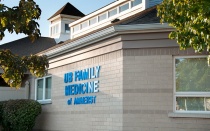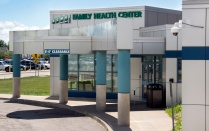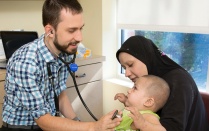Surgical Subspecialties
Our four-week surgical subspecialty rotation includes modules in ophthalmology, otolaryngology and urology.
On this page:
Ophthalmology
During your ophthalmology module, you’ll treat patients at Ross Eye Institute, a world-class center for eye care and research and headquarters of the UB ophthalmology department. You will also spend time at Lakeshore Eye Care working with a community othalmologist
You’ll work with an ophthalmology resident and the faculty ophthalmologist, performing common eye exams on patients of all ages. In your care of pediatric patients, you’ll learn how to evaluate and manage strabismus and amblyopia.
In addition to your clinical work, you’ll complete an electronic curriculum reviewing primary care ophthalmology issues and management.
Procedures Learned
During the ophthalmology module you’ll learn how to perform:
- direct and indirect fundascopic exams
- fluorescein eye exams
- slit lamp exams
- tonometry
- foreign body removal
You’ll recognize the indications for a variety of elective surgical procedures, including:
- cataract removal
- LASIK
- laser photocoagulation
- lens implants
- ocular alignment correction
You may observe corneal transplants and other surgical procedures.
Conditions Seen
You’ll learn how to diagnose and treat patients with:
- blepharitis
- cataracts
- chalazion
- conjunctivitis
- corneal abrasion/ulceration
- corneal foreign body
- dry eye syndrome
- glaucoma
- hordeolum
- ocular motility disorders
- subconjunctival hemorrhage
You’ll learn how to recognize conditions that require emergent ophthalmologic referral, including:
- acute glaucoma
- infectious keratitis
- hyphema/hypopyon
- postsepsal orbital cellulitis
- retinal detachment
- retinal hemorrhage
- uveitis
Clinical Site
Otolaryngology
Supervised by a faculty physician, you’ll manage patients at a community otolaryngology practice.
You’ll discuss ENT issues that apply to primary care physicians and learn to recognize the indications for a variety of ENT procedures.
This module helps you understand the rationale for audiology reports, Sinus X-rays, sleep studies and other relevant tests.
You’ll also complete an electronic curriculum that explains how to manage oral health disorders commonly seen in primary care.
Procedures Learned
During your otolaryngology module, you’ll become competent conducting:
- cranial nerve exams
- oral cancer screenings
- nasal and oropharyngeal exams
- tympanic membrane insufflation
You’ll learn how to perform:
- anterior nasal packing
- audiometry
- cerumen extraction
- the Epley maneuver
- nasolaryngoscopy/nasopharyngoscopy
- pneumoscopy
- tympanometry
You’ll also learn how to clear patients for otolaryngologic surgery.
Conditions Seen
During your otolaryngology module, you’ll learn how to diagnose and treat patients with:
- allergies
- angioedema
- cholesteatoma
- deep neck space infections
- headache
- hearing loss
- laryngitis/hoarseness
- neck adenopathy/mass
- otitis media/externa
- parotitis
- peritonsillar abscess
- pharyngitis
- rhinitis
- sinusitis
- sleep apnea
- TMJ
- tympanic membrane perforation
- vertigo
Clinical Site
Urology
Supervised by our urology faculty, you’ll see patients for initial visits and participate in diagnostic procedures, laboratory evaluations and pre- and postoperative assessments at the Buffalo VA Medical Center.
You’ll evaluate and determine the medical treatment for a range of urologic conditions and learn how to interpret relevant laboratory tests.
Procedures Learned
During your urology module, you’ll perform:
- adult and pediatric genito-urinary exams
- bladder catheterization
- prostate massage and microscopic exams of collected secretions
- microscopic urinalysis, including centrifugation of specimens
- digital rectal exams
Conditions Seen
Through this rotation, you’ll learn how to care for patients with:
- recurrent urinary tract infections
- renal colic
- urogenital neoplasia
- erectile dysfunction/impotence
- benign prostatic hypertrophy
- infertility
- sexually transmitted disease
- vesicoureteral reflux
- hematuria
- enuresis
Clinical Site
Year Taken
PGY-2
Length of Rotation
4 weeks








